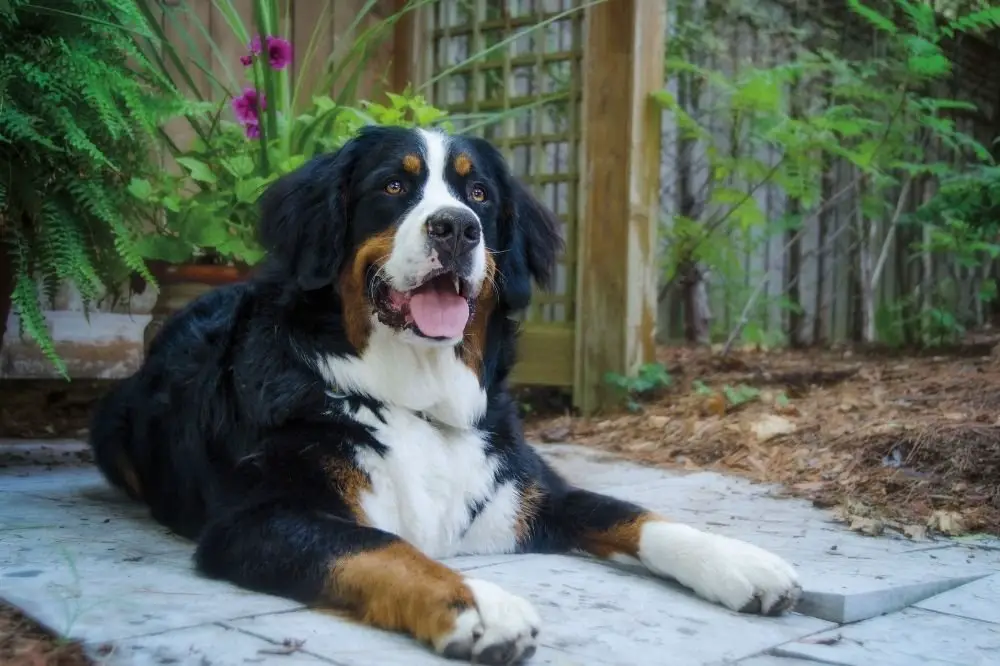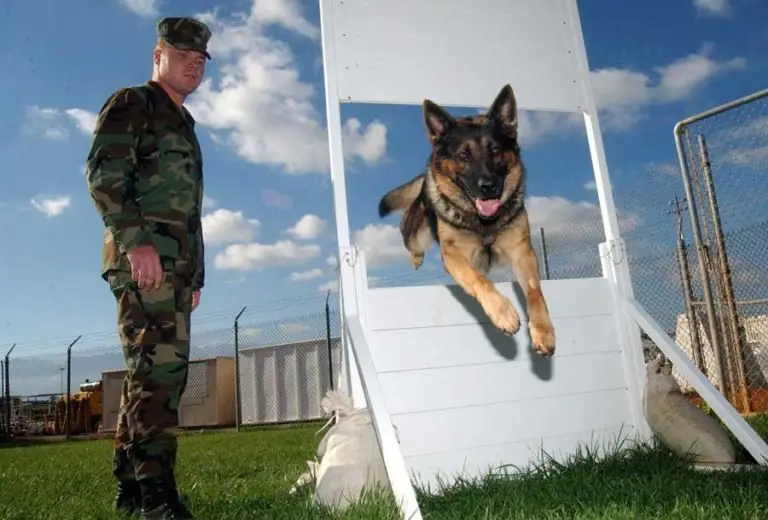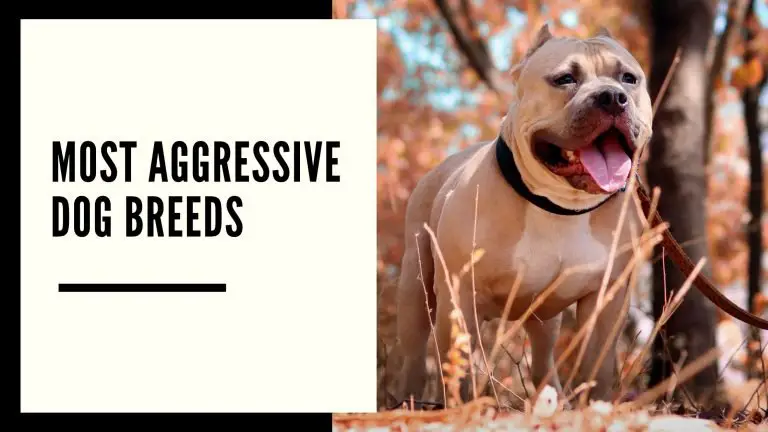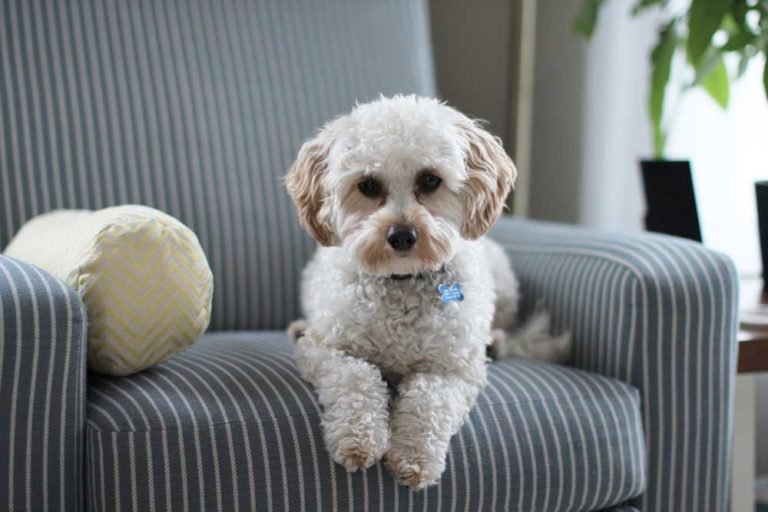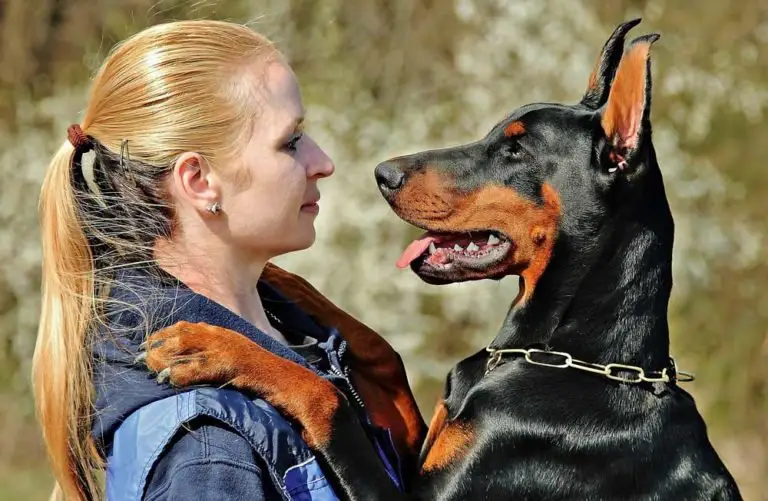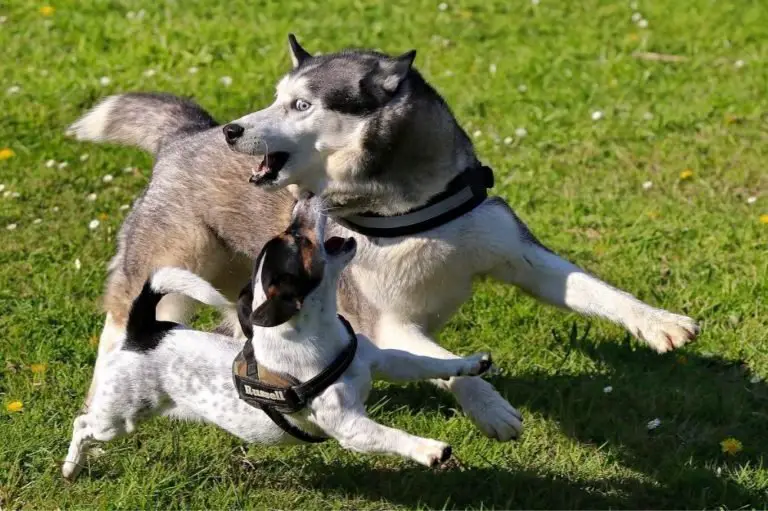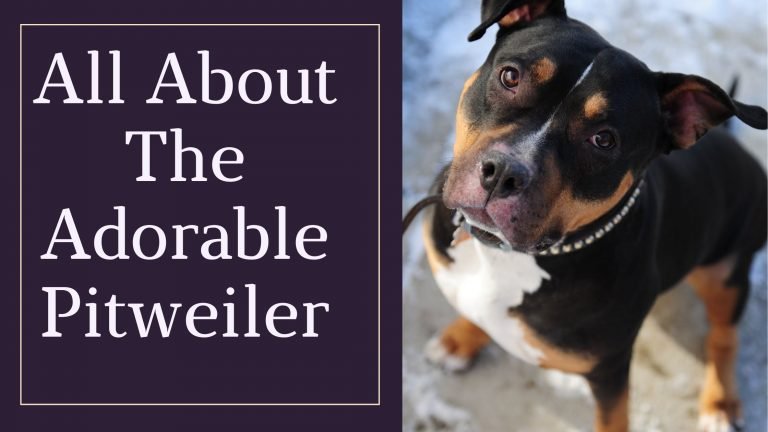Mini Bernese Mountain Dog (Complete Guide)
Beautiful, adorable, eager to please, calm, and obedient. All these words fit the Bernese Mountain Dog. With all these packed in one dog, the Bernese mountain dogs have for years been the go-to dog breed for more than a few dog lovers. However, there’s one thing about them that puts some people off—the giant size.
Usually, male Bernese mountain dogs can attain a shoulder height of 27.5 inches. The females can get to 26 inches. Also, the male Bernese mountain dogs can weigh a whopping 115 lbs. while females can achieve a maximum weight of 95 lbs. when mature. The large size of these dogs made them an excellent fit for their ancient duty.
Traditionally, Bernese mountain dogs were primarily for herding and transporting milk, cheese, and other related farm products in carts. That was about 2000 years ago.
While they served incredibly well in their ancient role, we no longer need dogs to pull carts and carry things around the farm.
In the current era, most dog lovers want canines with a smaller size that’s easily manageable. They need dogs that can serve as ideal family pets and in smaller duties like guarding and so on.
That means the size of the dog is no longer of interest. In fact, most people see the large size as more intimidating than it is of help.
Now, if you admire everything about the Bernese mountain dog except the size, you can think about getting a Miniature Bernese Mountain Dog.
Usually, these canines have a temperament similar to that of the Bernese Mountain dogs. However, they come in a smaller size. In other words, you can think of the Mini Bernese Mountain Dog as a smaller version of the Bernese Mountain Dog.
But before you buy a mini Bernese mountain dog, it’s wise to seek the ins and outs of the breed. Well, this article gives you the 411 on the Mini Bernese Mountain Dogs. Read through to know more about your potential future companion.
What is a Mini Bernese Mountain Dog?
Before we continue, it’s worth noting that the “Mini” in the “Mini Bernese Mountain Dog” is short for “Miniature” Therefore, we can also call them miniature Bernese Mountain Dogs. However, some dog lovers prefer to use the name mini Berners instead.
A mini Berner comes from crossing two purebred dog breeds, of which one of the parents is a purebred Bernese Mountain Dog. The other parent doesn’t have to be from a specific breed, although the dog has to be a smaller breed. More often, breeders prefer to opt for Cavalier King Charles Spaniel.
Just like any mixed breed, a mini Berner gets its personality, appearance, and health traits from the two parents. What the dogs inherit from each parent may differ from one mini Berner to the other. That means although we call them mini Bernese mountain dogs, they may not be an exact smaller version of the Bernese mountain dogs. In fact, when talking about the size, it’s usually similar to that of the smaller parent dog breed.
Appearance, Size, and Lifespan
About the appearance, Cavalier King Charles Spaniel looks almost the same as a Bernese mountain dog. As a result, a cross between the two dogs produces a mix that resembles the large Bernese mountain dogs.
Usually, a mini Bernese mountain dog has a tri-color coat. That’s similar to that of the purebred Bernese mountain dogs. Therefore, when looking at one, you may think you are staring at a Bernese mountain dog that’s not fully grown.
Also, a typical mini Berner has a thick coat. That makes it possible for them to thrive in colder climates. However, like other dogs with similar coats, mini Berners may not do well in hot weather or climate. That’s because the thick layer of fur increases the chances of developing heatstroke.
As stated earlier, the size of a mini Berner is similar to that of Cavalier King Charles Spaniel. On average, a mature mini Berner weighs between 11-17 pounds. The mini Berner stands at about 12 inches tall. That’s way smaller than the size of a fully-grown Bernese Mountain dog.
Nevertheless, it’s worth remembering that the size and weight of any mixed breed may differ widely. The individual dog’s characteristics will depend on which parent’s traits are more dominant in the offspring. However, you can expect a size that’s between the size of the two parents.
As with the size, the lifespan of mini Berners varies from one dog to the other. Generally, you can expect the life expectancy to be somewhere between 8-13 years. The lifestyle and health status are two factors that affect your dog’s lifespan.
Therefore, in a nutshell, a mini Berner is a fantastic pet for anyone who loves the look of the larger Berner dogs but prefers the size of a Cavalier King Charles Spaniel instead.
The Temperament of Mini Berners

Like with any other mixed breed, we can’t precisely predict the temperament of a mini Berner. That’s because these dogs inherit their personality from the two parents, who most of the time don’t share the same traits.
However, looking at the common traits between the parents, we can predict some characteristics of the mix. For instance, Bernese mountain dogs are friendly, obedient, and smart. That’s the same with Cavalier King Charles Spaniel. Therefore, we expect a mix of these two dogs to have all these traits.
Additionally, the two parents have a strong prey drive and love to spend most of the time chasing. As a result, if you want a mini Berner, you should be ready to keep them on a leash all the time unless you have a well-fenced home.
If you have interacted with either of the parents, you can confirm that they are so friendly. That’s a good trait for homes that get visitors more often.
However, it comes with its drawbacks. For instance, friendly dogs don’t make excellent guard dogs. With that said, a mini Bernese mountain dog may not make a good watchdog unless with proper training.
The Adaptability of Mini Berners
As stated earlier, mini Berners are like a smaller version of the large Burners. Therefore, they make excellent dogs for homes with limited space like apartments. If you have a junior who loves to play around with pets, the smaller size is also well-suited for them.
One thing to know about these dogs is that they are social beings. Therefore, mini Berners don’t do well when left alone for long periods. With that said, before you bring one to your family, find ways to make them feel like part of the family.
Also, with their friendly nature, these canines take less time to make friends with new people. If you have another dog already, you will be happy to learn that these dogs bond strongly with other dogs.
As we expect from most dogs that have a hunting drive and a big urge to run after prey, mini Berners may more often try to chase after your feline. But as long as you socialize your dog with your cat at an early stage, they should get along smoothly.
Exercise Requirements
Bernese mountain dogs are active dogs with massive strength. This strength made it possible for them to pull loads many times their weight. When talking about mini Berners, we can’t associate them with the same level of strength.
Generally, miniature Bernese mountain dogs have a moderate energy level. That means they don’t need plenty of activity like purebred Berners, German shepherds, Labs, Huskies, and other high-energy dog breeds.
A typical mini Bernese mountain dog will need about an hour of exercise daily. If you have the time, you can schedule exercise sessions once a day. For people with busy schedules, breaking down this time into multiple sessions should still work fine.
Planning for a routine walk every day is one way to keep your mini Berner in great shape. Other alternative ways you can ensure that you meet your canine’s daily energy requirements include playing a game of fetch, tug-of-war, agility classes, and more.
With an adequate activity level, your mini Berner will have a wonderful life. Enough exercise will prevent conditions like obesity, diabetes, and more. Exercise moments are also a perfect time to interact with your pet.
Mini Bernese Mountain Dog & Training
The Bernese mountain dog ranks the 22nd most intelligent dog. The Cavalier King Charles Spaniel comes 44th. That’s according to the study by Stanley Coren, a canine psychology professor, and neuropsychology researcher.
The professor at the University of British Columbia goes further to claim that Berners understand a new command after 5 to 15 repetitions and obey the first command at least 85% of the time.
Based on his ranking, the Cavalier King Charles Spaniels are less intelligent. According to Coren, these dogs will understand new commands after 25 to 40 repetitions and obey the first command at least 50% of the time.
With that information, it’s evident that mini Berners are intelligent dogs. They are also very eager to please their human partner. That means it won’t take plenty of time and effort to make them understand new commands. Like any other dog, it’s good when you introduce them into training in their puppyhood.
Start by teaching your mini Berner basic cues. You will first want to train your dog to respond to commands like “sit,” “come,” and so on. You are going to use these commands in almost every training. Hence, ensure that your dog knows how to respond well to them.
Like any other dog, use rewards and praise to reinforce a command. Follow all the training tips. Keep your cues short (preferably one word) and remain consistent. Also, make the sessions short and more fun.
Mini Bernese Mountain Dog & Nutrition
The food requirements of a mini Berner isn’t any different from that of other dogs. The food has to be rich in proteins. Puppies need more proteins than adults since they are still growing.
Proteins contain amino acids that help in building and repairing muscles. According to experts, of the 23 amino acids that a dog’s body needs, they only make 10 of them. The remaining 13 have to come from food.
Generally, 22% of a puppy’s food should constitute proteins. An adult dog will need a lower protein content of about 18%. However, ensure that you don’t give them plenty of proteins as it may attract some health-related conditions.
Additionally, like other dogs, mini Berners also need food that’s rich in fats. Fats will give your dog energy and keep their coat healthy. The fat content here should account for 10-15% of their daily intake.
The quantity of food will differ from one dog to another. How much to feed your dog depends on the age, activity level, and health status. Growing mini Berners need more food than senior canines. Also, more active dogs require a larger intake than “lazy” ones. That’s why you need to consult with your vet on the right quantity for your dog.
Mini Bernese Mountain Dogs & Health
Like any other mixed breed, most of the health conditions in mini Berners come from the parents. A mini Berner can inherit a medical complication from parents or at least the genes that make them vulnerable to some diseases.
With that said, for us to predict the conditions that a mini Berner is more likely to develop, we need to understand the common health concerns in the parents.
Some of the common health concerns in Bernese mountain dogs are canine hip dysplasia (CHD), elbow dysplasia, progressive retinal atrophy (PRA), degenerative Myelopathy, gastric torsion, histiocytosis, and more.
Cavalier King Charles Spaniels are more susceptible to Mitral Valve Disease (MVD). In fact, about 50% of these canines develop MVD before they attain the age of 5. Other common conditions include hip dysplasia, cataracts, allergies, epilepsy, luxating patellas, and more.
With that said, a mini Berner stands the risk to develop any of these diseases. That’s especially true for congenital conditions like hip dysplasia. At times, hereditary diseases won’t show up until later in their lives.
Where no conditions are from the parents, there’s still some chance of developing them later. For that reason, you have to monitor your dog closely to notice any signs of sickness. The only way you are going know when your dog gets sick is by knowing your dog better.
Where possible, keep your dog up-to-date in vaccination. Vaccines will cost less than the amount you may have to pay your vet to treat your pet. Actually, that’s where we get the common phrase— an ounce of prevention is worth a pound of cure.
Grooming and Care
Since they are loyal, friendly, and adorable companions, we should all replicate that by giving mini Berners a happy life. Now, one of the ways you can keep your mini Berner happy all day is by proper grooming.
Mini Berners have a long coat. To avoid or remove tangles and keep them comfortable, you will need to brush your mini Berner several times a week. These dogs shed throughout the year, although it’s heavier in some moments of the year than others.
Brushing your pup more often keeps them comfortable and free from loose fur. Brushing frequently prevents loose fur from scattering all over the place in your house.
The thick coat may make them uncomfortable when the temperatures soar. That’s why you should never leave them in the sun for long. To keep them comfortable in hot weather, ensure that you bathe them more often. A bath every week or two should work just fine.
Other than the coat, another area that needs your attention is the nails. Trimming your dog’s nails once a month should keep them healthy and comfortable. If you reside in areas where de-icing chemicals are common, put effort to keep your pup’s nails short always.
Mini Berners also need good oral care. You can do that by brushing their teeth several times a week to keep them from teeth-related issues. For brushing, don’t use human toothpaste as it contains Xylitol, a chemical that poses grave danger to canines.
You can ask your vet to advise on the toothpaste to use if you aren’t sure what to use for your pet. Making use of a dental health diet or dental chews is also a good idea.
Mini Berners have floppy ears. Therefore, they are more likely to trap moisture, dust, and other stuff that may attract ear-related conditions. To keep your dog healthy, ensure that you inspect their ears closely.
Instinctively, dogs don’t like the idea of touching their paws, mouth, and nails. That means it will be good to have your mini Berner get used to it at their puppyhood. That way, you will find grooming to be a smooth process once they grow.
Conclusion
With the fantastic personalities of the parents, it’s easy to see why there’s a spike in demand for mini Berners. As parents, these adorable dogs are friendly, social, intelligent, trainable, and loyal. In other words, mini Berners have almost everything (if not all) that most people look out for in dogs.
However, it’s good to remember your dog is what you want him to be. Training your mini Berner allows you to instill the character you want in him. You can have a professional trainer do the work or do it yourself.
Lastly, one secret to keeping your mini Berner healthy is to monitor their health closely. Putting preventive measures will go a long way to keep your pup from developing some conditions and reduce pet costs.

